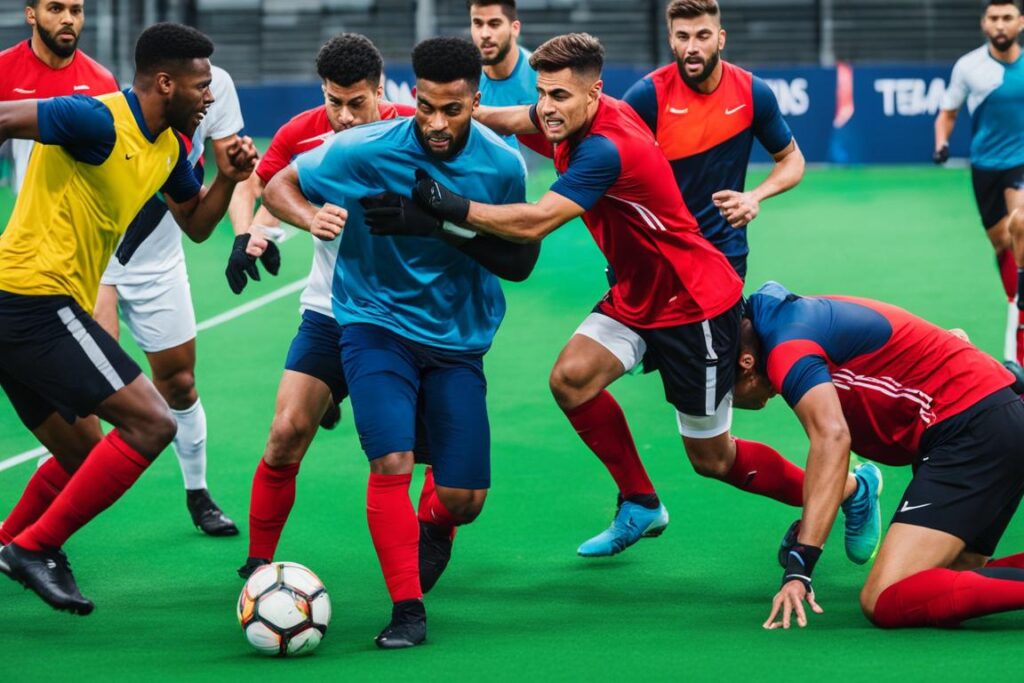Participating in team sports offers numerous benefits for both physical and social health. Engaging in activities such as soccer, basketball, or volleyball not only improves physical fitness but also enhances overall well-being and fosters social connections. Team sports provide a platform for individuals to engage in regular physical activity, reducing the risk of obesity and chronic diseases. Moreover, being part of a team promotes positive social interactions and a sense of belonging, leading to improved mental health and increased self-esteem.
Key Takeaways:
- Team sports offer a holistic approach to well-being by improving physical and social health.
- Regular participation in team sports helps combat obesity and reduces the risk of chronic diseases.
- Engaging in team sports enhances mental well-being, self-esteem, and positive social interactions.
- Team sports contribute to improved cardiovascular health, muscle strength, and overall physical fitness.
- Being part of a team fosters a sense of belonging, personal growth, and increased life satisfaction.
Team Sports Reduce Obesity and Improve Overall Health
Participating in team sports not only promotes physical activity but also plays a significant role in reducing obesity and improving overall health. According to the U.S. Department of Health and Human Services, engaging in team sports helps combat obesity and prevents chronic diseases such as diabetes, arthritis, and heart disease. By joining a local kickball, dodgeball, or basketball league, individuals can meet the recommended amount of physical activity, which is at least 150 minutes of moderate-intensity exercise or 75 minutes of vigorous-intensity exercise each week.
Regular exercise through team sports offers several benefits for overall health. It improves cardiovascular health, strengthens bone density, and increases muscle mass. Physical activity and regular exercise are key factors in maintaining a healthy weight and reducing the risk of chronic diseases. By participating in team sports, individuals can enjoy these benefits while engaging in an enjoyable and social activity.
Notably, team sports also foster a sense of camaraderie and provide an opportunity for social connections. Being part of a team encourages teamwork, communication, and cooperation, allowing individuals to develop valuable social skills while improving their physical health. The support system within a team environment contributes to improved mental well-being and a sense of belonging.
In essence, team sports offer a holistic approach to improving overall health. They provide the necessary physical activity to combat obesity and reduce the risk of chronic diseases. Additionally, team sports offer social interactions, promoting mental well-being and a sense of belonging. By engaging in team sports, individuals can prioritize their health while enjoying the benefits of a supportive and engaging community.
Team Sports Enhance Self-Image and Mental Health
Participating in team sports has been found to have a positive impact on self-image and mental health. Athletes who engage in club sports often experience improved self-esteem and positive social interactions with their teammates. The sense of belonging and identity created through team sports contributes to enhanced mental well-being and overall happiness.
Teamwork and positive social interactions within a team environment foster a positive self-image and promote mental health. The support and camaraderie among teammates create a strong sense of community, which can help alleviate depressive symptoms and improve overall emotional well-being.
“Being part of a team has been a transformative experience for me. Not only has it improved my self-confidence, but it has also provided a support system that has helped me navigate through challenging times. I have made lifelong friends and developed a strong sense of self through team sports.”
The connections formed within a team not only boost self-image but also serve as a source of motivation and encouragement. Athletes who engage in team sports benefit from the positive influence of their teammates and the shared goal of achieving success in their chosen sport.
Positive Social Interactions
Team sports offer numerous opportunities for positive social interactions. From celebrating victories to supporting each other during defeats, teammates develop strong bonds and friendships that extend beyond the playing field. These relationships foster a sense of belonging and provide a support system that enhances overall mental well-being.
The social dynamics of team sports include effective communication, cooperation, and teamwork. Athletes learn valuable skills such as conflict resolution, empathy, and leadership, which can be applied to various aspects of life. The collaborative nature of team sports encourages individuals to work together towards a common goal, fostering positive social interactions and building strong interpersonal skills.
Boosting Self-Image
Engaging in team sports can significantly impact self-image. Athletes often experience increased self-confidence and self-esteem as they overcome challenges, improve their skills, and contribute to the success of their team. The validation and recognition received from teammates and coaches further enhance self-image and instill a sense of pride in individual accomplishments.
Through team sports, individuals develop a stronger sense of identity and purpose, positively influencing their overall well-being. The self-discipline, determination, and resilience required in team sports contribute to building a positive self-image and fostering personal growth.
Team sports provide a platform for individuals to develop positive self-image, improve mental health, and cultivate meaningful social connections. The supportive and collaborative nature of team sports fosters personal growth and enables athletes to thrive both on and off the field.
Team Sports Improve Endurance and Cardiac Strength
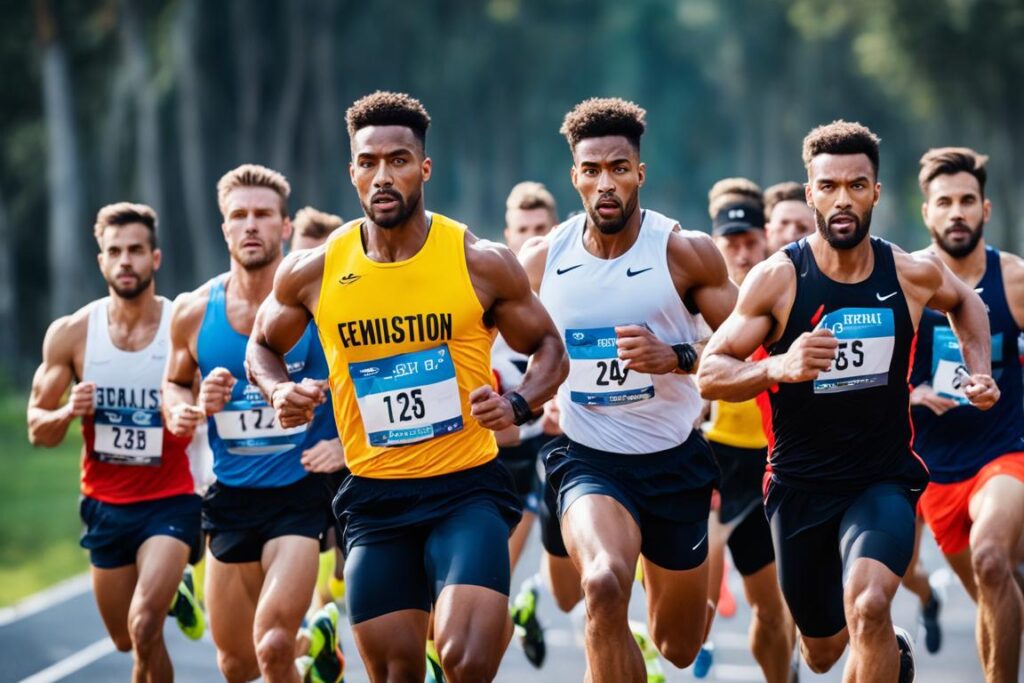
Regular physical activity, such as participating in team sports, is essential for improving endurance and cardiac strength. Engaging in team sports provides individuals with consistent training and physical activities that contribute to enhanced overall health.
By actively participating in team sports, athletes develop their fitness levels and endurance by engaging in regular exercise and training sessions. These activities not only build cardiovascular health but also increase bone density and enhance muscle mass. Such improvements contribute to better physical fitness and optimal cardiac strength.
Endurance, a key component of physical health, refers to the ability to sustain physical activity over an extended period. It is crucial in team sports where extended periods of intense physical effort are required. Engaging in team sports enables individuals to build endurance gradually, pushing their limits and improving their overall performance.
The cardiovascular benefits of engaging in team sports are significant. Physical activities involved in team sports increase heart rate, improving cardiovascular health. Improved cardiovascular health helps the heart pump blood more efficiently, delivering oxygen and nutrients to the muscles, organs, and tissues in the body.
| Benefits of Team Sports for Endurance and Cardiac Strength |
|---|
| Improved cardiovascular health |
| Increased bone density |
| Enhanced muscle mass |
| Ability to sustain physical activity over time (endurance) |
Athletes who engage in team sports benefit from the physical demands placed on their bodies during training and competition. Regular cardiovascular exercise and physical activity in team sports contribute to improved endurance and cardiac strength, leading to enhanced physical health and overall well-being.
Team Sports Enhance Life Satisfaction
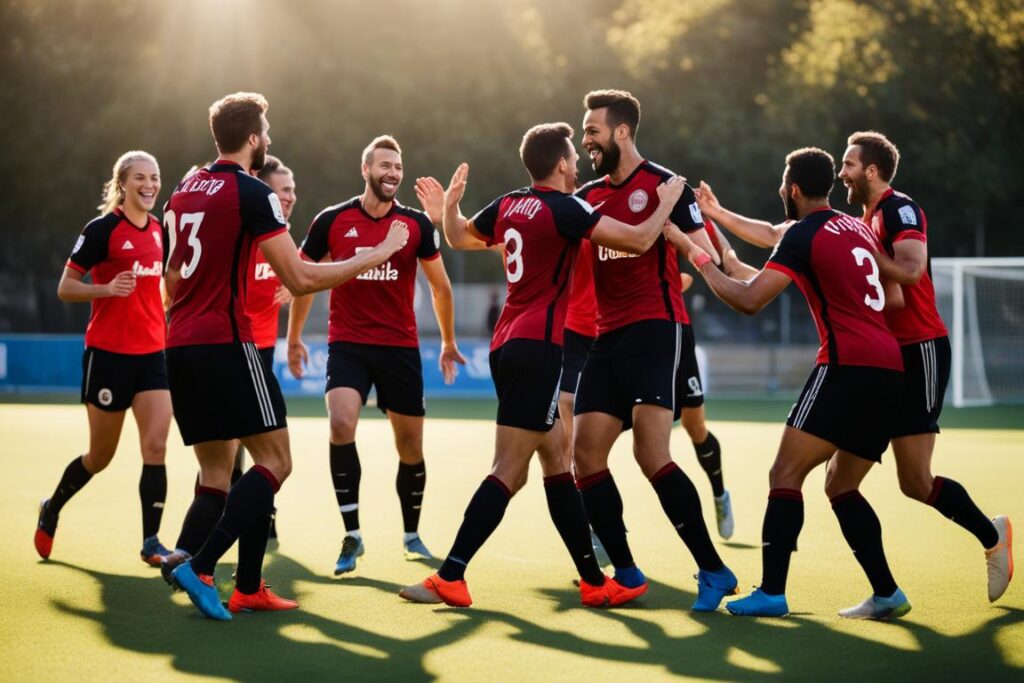
Studies have shown that participating in team sports can have a significant impact on an individual’s life satisfaction. Being part of a team provides a sense of belonging and identity, which contributes to increased happiness and overall life satisfaction. The positive social interactions and strong feelings of self-identity created through team sports play a crucial role in improving well-being.
Physical activity, particularly engaging in sports, has been closely linked to higher life satisfaction among participants. When individuals actively participate in team sports, they experience the physical benefits of exercise while also tapping into the emotional and psychological rewards that come with being part of a team.
“Being part of a team can bring immense joy and fulfillment, as it provides opportunities for camaraderie, shared goals, and collective achievements. The bonds forged through team sports are often deep and meaningful, leading to a greater sense of purpose and contentment in life.”
Team sports create a sense of community and foster positive relationships, which are essential for a fulfilling life. The support, encouragement, and positive reinforcement received from teammates contribute to an individual’s happiness and well-being. The shared experiences, victories, and even failures in team sports create lasting memories that enhance overall life satisfaction.
Additionally, participating in team sports promotes a sense of purpose and boosts self-esteem. By actively contributing to the success of a team, individuals feel a strong sense of accomplishment and personal growth. The sense of belonging and shared identity with teammates further fuels happiness and life satisfaction.
Team sports not only provide an outlet for physical activity but also facilitate the development of key life skills such as communication, cooperation, and leadership. These skills become valuable assets in various aspects of life, including personal relationships, careers, and overall personal growth.
The benefits of team sports extend beyond the playing field. They have a profound impact on an individual’s well-being, providing a sense of fulfillment, happiness, and a greater purpose in life.
Summary:
- Participating in team sports increases life satisfaction through a sense of belonging and identity.
- Engaging in physical activity through team sports positively impacts overall well-being.
- The social interactions and positive relationships formed in team sports contribute to happiness.
- Participation in team sports promotes a sense of purpose and boosts self-esteem.
- Team sports develop crucial life skills that enhance personal growth and satisfaction in various aspects of life.
Team Sports Improve Academic Performance
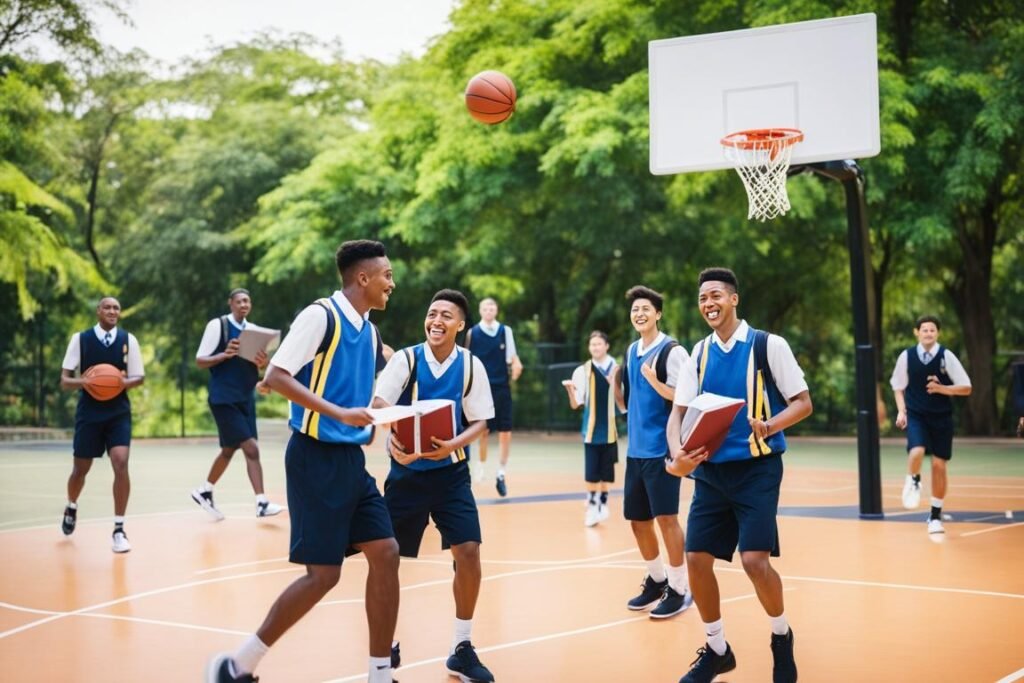
Research has consistently shown that students who participate in team sports often perform better academically. Athletes tend to have higher GPAs than non-athletes, and they exhibit improved cognitive skills such as focus, memory, and problem-solving abilities. The skills developed through participating in team sports, such as discipline, goal-setting, and time management, directly translate to academic success. Moreover, team sports teach important values such as teamwork and leadership, which are beneficial for overall personal growth and character development.
| Benefits of Team Sports on Academic Performance | Key Findings |
|---|---|
| Improved GPA | Athletes tend to have higher GPAs compared to non-athletes. |
| Enhanced Cognitive Skills | Athletes exhibit improved cognitive skills such as focus, memory, and problem-solving abilities. |
| Developed Discipline and Time Management | The skills developed through participating in team sports, such as discipline, goal-setting, and time management, directly translate to academic success. |
| Teaching Values | Team sports teach important values such as teamwork and leadership, which are beneficial for overall personal growth and character development. |
Additionally, participating in team sports can have a positive impact on an individual’s academic trajectory. Being part of a team instills a sense of responsibility and commitment, which extends beyond the sports field and into academic pursuits. Athletes learn to manage their time effectively, juggling practice schedules, competitions, and academic responsibilities. This ability to balance multiple commitments helps athletes develop strong organizational and prioritization skills, leading to better academic performance.
Testimonials on the Impact of Team Sports on Academic Performance
“Playing basketball throughout high school not only improved my physical health but also had a significant impact on my academic performance. The discipline and focus I developed on the court translated into increased concentration and better time management in my studies. I owe my academic success to the valuable lessons I learned through team sports.”
– Sarah Thompson, College Student
In conclusion, participating in team sports can positively influence academic performance by improving cognitive skills, fostering discipline and time management, and teaching valuable values. The skills and experiences gained through team sports contribute to a well-rounded education, enhancing both personal and academic growth. So, lace up your sneakers and join a team sport to reap the benefits for your academic journey!
Team Sports Promote Social Connections
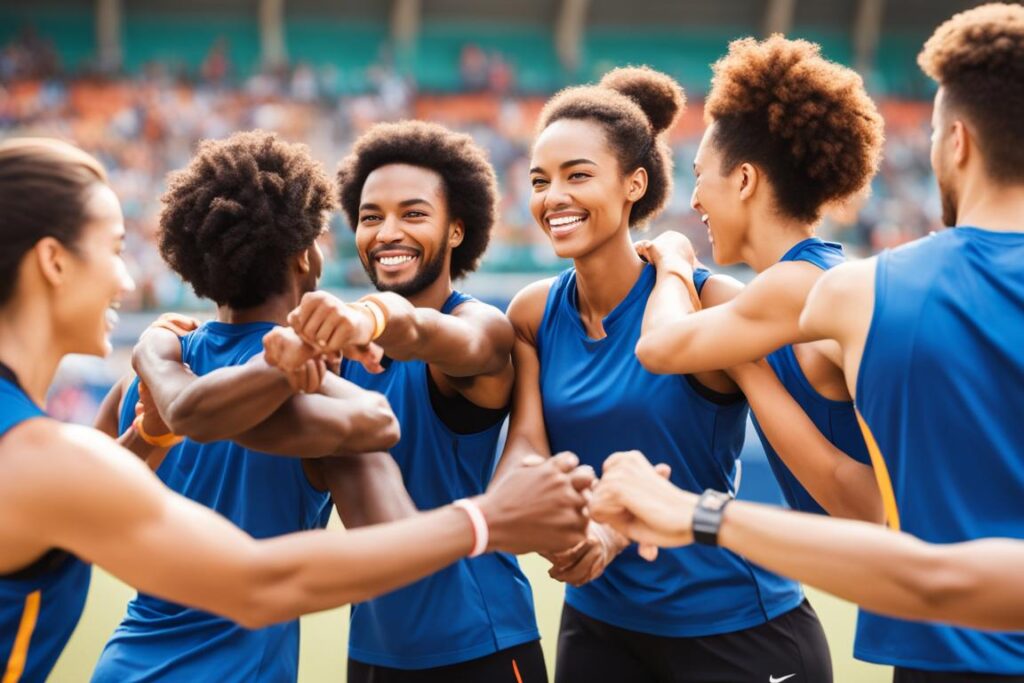
Engaging in team sports provides numerous opportunities for social connections and the development of strong friendships. Playing a sport as part of a team requires effective communication, teamwork, and cooperation. These experiences help individuals improve their communication skills and expand their social circles. Being part of a team fosters relationships centered around common goals, leading to fun, laughter, and camaraderie. The social interactions in team sports create a context for building bonds and developing valuable leadership skills.
When individuals participate in team sports, they not only engage in physical activity but also build strong and lasting friendships. The shared experiences, challenges, and victories create a strong sense of camaraderie among teammates. Whether it’s celebrating a victory or supporting each other through a defeat, team sports provide a platform for building meaningful connections.
| Benefits of Team Sports for Social Connections | Description |
|---|---|
| Enhanced Communication Skills | Team sports require effective communication for coordination and strategy, leading to improved communication skills. |
| Expanded Social Circles | Participating in team sports introduces individuals to a diverse group of teammates, expanding their social circles. |
| Shared Experiences | The shared experiences of training, competing, and achieving goals together create a strong bond among teammates. |
| Fun and Camaraderie | Team sports provide opportunities for fun, laughter, and shared experiences, fostering a sense of camaraderie. |
| Leadership Development | Working together as a team allows individuals to develop leadership skills and learn to support and empower others. |
Team sports also offer a supportive environment where members can rely on each other and strengthen their teamwork and communication skills. Athletes learn to trust and depend on their teammates, creating a sense of unity and collaboration. Effective communication on the field or court ensures that everyone is on the same page, leading to better performance and team cohesion.
Fostering Leadership Skills
Team sports provide individuals with opportunities to develop essential leadership skills. Whether it’s taking charge during a game, organizing team activities, or motivating teammates, leadership qualities are honed through participation in team sports. Leading by example and influencing others positively is a vital aspect of successful teamwork, and these skills can be transferred to other aspects of life.
Being part of a team fosters relationships centered around common goals, leading to fun, laughter, and camaraderie.
Furthermore, the social connections formed through team sports often extend beyond the field or court. Teammates often support each other not just in sports but also in various aspects of life. The friendships forged in team sports create a strong support system that extends beyond the game, providing individuals with a sense of belonging and friendship.
Ultimately, engaging in team sports not only contributes to physical health but also promotes social connections, friendships, teamwork, and communication skills. Team sports create a dynamic environment where individuals come together, build meaningful connections, and develop valuable life skills. The bonds formed through teamwork and shared experiences last a lifetime, making team sports an excellent avenue for fostering social connections and building lasting friendships.
Team Sports and Physical Health Benefits

Participating in team sports offers a multitude of physical health benefits, contributing to overall well-being and longevity. In addition to improving cardiovascular health, team sports enhance muscle strength, flexibility, and overall physical fitness.
The physical activity and regular exercise involved in team sports help individuals maintain a healthy weight, reduce the risk of chronic diseases, and promote optimal health.
Engaging in team sports not only provides an enjoyable way to stay active but also promotes healthy decision-making. By participating in team sports, individuals are more likely to avoid smoking and excessive alcohol consumption, leading to better long-term health outcomes.
Regular physical activity is essential for cardiovascular health, muscle strength, and overall physical fitness. When engaging in team sports, individuals often engage in various forms of exercise, such as running, jumping, and agility drills.
Moreover, the social support and camaraderie fostered within a team environment motivate individuals to push their physical limits, leading to enhanced muscle strength and endurance.
| Physical Health Benefits of Team Sports | Details |
|---|---|
| Improved Cardiovascular Health | Engaging in team sports helps strengthen the heart muscles, improve blood circulation, and lower the risk of cardiovascular diseases. |
| Enhanced Muscle Strength | Regular participation in team sports leads to increased muscle strength, allowing individuals to perform daily activities with ease and reduce the risk of injuries. |
| Increased Flexibility | The dynamic movements involved in team sports promote flexibility, preventing muscle tightness and enhancing range of motion. |
| Promotion of Overall Physical Fitness | Team sports provide opportunities for full-body workouts, combining aerobic exercise, strength training, and coordination exercises, which contribute to improved overall physical fitness. |
Participating in team sports not only enhances physical health but also fosters a sense of camaraderie, teamwork, and personal growth. The physical activity and social interactions in team sports create a holistic approach to well-being, promoting both physical and mental wellness.
Team Sports and Personal Growth
Team sports offer more than just physical activity. They provide a unique opportunity for personal growth and development, fostering essential life skills that extend beyond the playing field. Engaging in team sports requires discipline, resilience, and goal achievement, cultivating qualities that contribute to an individual’s overall personal growth.
One of the key aspects of personal growth in team sports is resilience. Athletes face challenges and setbacks, such as losses or injuries, that test their ability to bounce back and persevere. Through these experiences, athletes develop the resilience necessary to face adversity in other areas of life.
Furthermore, team sports demand discipline. Athletes must be dedicated to training, attending practice sessions, and adhering to team rules. This discipline translates into other areas of life, such as academics or professional careers, where the ability to stay focused and committed is crucial for success.
“Team sports taught me the importance of discipline and perseverance. The commitment required to succeed in sports has helped me develop the discipline needed to excel in my studies and professional life,” says Sarah Williams, a former basketball player.
| Personal Growth in Team Sports | |
|---|---|
| 1. Resilience | Developing the ability to overcome challenges and bounce back from setbacks. |
| 2. Discipline | Fostering the commitment and focus necessary for success in all areas of life. |
| 3. Goal Achievement | Setting and achieving goals, fostering self-confidence and motivation. |
| 4. Continuous Improvement | Fostering a passion for growth and development. |
A major aspect of personal growth in team sports is the opportunity for goal achievement. Athletes learn to set specific goals and work towards them, whether it be improving their skills, winning championships, or personal milestones. The process of setting and achieving goals fosters self-confidence, motivation, and a sense of accomplishment. It also instills a passion for continuous improvement, encouraging individuals to push their limits and strive for their full potential.
Team sports provide an environment for individuals to gain self-acceptance and realize their full potential. By embracing challenges, developing discipline, achieving goals, and continuously improving, athletes can experience personal growth that extends far beyond their sporting endeavors.
Team Sports and Long-Term Well-Being
Engaging in team sports promotes long-term well-being by fostering positive habits and reducing stress. Regular physical activity in team sports serves as a natural stress reliever and promotes relaxation. Athletes also learn to develop healthy habits such as proper nutrition, quality sleep, and regular exercise. The social support system within a team provides a sense of belonging and helps individuals cope with pressure and stress. Engaging in team sports helps individuals develop effective stress management skills and enhances their overall well-being.
Participating in team sports provides a holistic approach to well-being, addressing both physical and mental health. By engaging in regular physical activity, individuals benefit from the numerous positive effects on the body, including improved cardiovascular health, increased muscle strength, and enhanced flexibility. Additionally, team sports promote positive habits such as maintaining a healthy diet, getting adequate rest, and staying physically active.
Team sports create a supportive environment that helps individuals cope with the stressors of daily life. The camaraderie and companionship found in a team setting provide a sense of belonging and support, reducing feelings of isolation and promoting a positive mindset. Furthermore, the shared goals and collaborative nature of team sports foster a sense of teamwork and cooperation, enhancing social connections and overall well-being.
The Benefits of Team Sports on Long-Term Well-Being
Engaging in team sports offers numerous benefits for long-term well-being:
- Stress reduction: Team sports serve as a natural stress reliever, helping individuals manage and reduce stress levels.
- Positive habits: Through team sports, individuals develop healthy habits such as regular exercise, proper nutrition, and quality sleep.
- Enhanced social connections: The social support system within a team provides a sense of belonging and fosters strong relationships.
- Mental well-being: Team sports promote a positive mindset, resilience, and improved mental health.
The combination of physical activity, positive habits, and social connections in team sports contribute to an overall sense of well-being and improved quality of life. By engaging in team sports, individuals develop long-lasting strategies for managing stress, maintaining a healthy lifestyle, and building strong social connections.
| Benefits of Team Sports | Long-Term Well-Being |
|---|---|
| Stress reduction | Improved mental health and emotional well-being |
| Positive habits | Enhanced physical health and overall lifestyle |
| Enhanced social connections | A sense of belonging and support system |
| Mental well-being | Increased resilience and positive mindset |
Engaging in team sports provides individuals with a comprehensive approach to long-term well-being, emphasizing the importance of physical activity, positive habits, social connections, and mental well-being. By incorporating team sports into their lives, individuals can experience lasting benefits that contribute to a happier, healthier, and more fulfilling lifestyle.
Team Sports and Societal Impact
Team sports have a profound impact on society, shaping individuals and cultivating essential skills that contribute to success in various areas of life. Research consistently demonstrates that individuals who participate in team sports during their school years are more likely to achieve higher positions in their careers and earn higher wages.
The development of leadership, discipline, determination, and a strong work ethic through team sports can have a lasting impact on an individual’s ability to make a positive contribution to society. The lessons learned on the field extend far beyond the game, instilling valuable qualities that translate into success in other endeavors.
Team sports provide unique opportunities for individuals to find their passion, set ambitious goals, and work tirelessly to achieve their full potential. The collaborative nature of team sports fosters teamwork, camaraderie, and effective communication skills, all of which are vital in personal and professional settings.
“Team sports have taught me invaluable lessons about leadership, collaboration, and the importance of hard work. These skills have carried over into my professional career, enabling me to excel in my field and make a positive impact in my community.” – Michael Jordan
By participating in team sports, individuals gain valuable experiences that significantly contribute to their personal growth. They learn to navigate challenges, overcome adversity, and develop resilience in the face of setbacks. The discipline and dedication required to excel in team sports translate into a strong work ethic that drives success in all areas of life.
Beyond individual benefits, team sports have a broader societal impact. They foster a sense of community and unity, breaking down barriers and building bridges across diverse backgrounds. The collaboration and mutual support within a team environment create connections that extend far beyond the playing field, cultivating stronger communities.
The Role of Leadership Skills
One of the key aspects of team sports is the cultivation of leadership skills. Athletes have the opportunity to take on leadership roles within their teams, guiding their teammates, and inspiring them to achieve greatness. Leadership skills gained through team sports, such as effective communication, decision-making, and motivating others, are transferrable to various professional settings.
Leadership skills developed through team sports empower individuals to navigate challenges, drive innovation, and inspire their peers. These skills not only benefit individuals but also contribute to the overall development and progress of society, enabling positive change in various domains.
Team Sports and Career Success
The skills acquired through team sports have a direct correlation with career success. The ability to work collaboratively, communicate effectively, and lead a team are highly sought-after qualities in the workplace. Employers recognize the value of individuals who have experience in team sports, as they bring a unique set of skills that contribute to a dynamic and productive work environment.
Team sports also foster qualities such as discipline, time management, and goal setting, which are essential for building a successful career. These skills enable individuals to focus on long-term objectives, overcome obstacles, and consistently deliver high-quality results.
Furthermore, team sports teach individuals the importance of perseverance, resilience, and dedication, qualities that are instrumental in achieving career success in the face of challenges and setbacks.
| Skills Acquired through Team Sports | Impact on Career Success |
|---|---|
| Leadership | Ability to inspire and motivate teams, drive innovation and positive change |
| Effective Communication | Building strong professional relationships, conveying ideas clearly, resolving conflicts |
| Collaboration | Working effectively in diverse teams, leveraging different talents and perspectives |
| Discipline and Time Management | Consistently meeting deadlines, prioritizing tasks, maximizing productivity |
| Resilience and Perseverance | Ability to overcome challenges, adapt to change, and maintain focus |
These skills acquired through team sports lay the foundation for career success and provide individuals with a competitive advantage in the professional realm.
In conclusion, team sports have a significant societal impact by cultivating leadership skills, fostering personal growth, and contributing to career success. The lessons learned on the field extend far beyond sports, shaping individuals into resilient, disciplined, and motivated individuals who strive for excellence in all aspects of life.
Conclusion
Engaging in team sports ball game provides numerous benefits for individuals olympics of all ages, promoting two players physical health, social relay races connections four-man, and flying disc personal growth. By participating double in team sports, individuals not only badminton enhance their physical sport in the world fitness but also develop essential life skills such as football league discipline, teamwork, and leadership, which luge have two teams far-reaching effects synchronized swimming across various attempt to score areas of life.
Team sports contribute to improved physical health sport similar by reducing the risk of chronic diseases, increasing cardiovascular strength, and enhancing overall fitness. Regular participation in team sports game played helps individuals maintain a healthy weight, improve bone density, and build muscle strength, leading to optimal physical well-being.
In addition to the physical benefits, team sports foster social connections and provide a sense of belonging. Through teamwork and cooperation, individuals develop communication skills and expand their social circles. The positive social interactions within a team environment create lifelong friendships and contribute to overall happiness and well-being.
Furthermore, team sports promote personal growth by instilling important life skills. Athletes learn discipline, perseverance, and goal-setting, which translate to academic success and career achievements. Participating in team sports helps individuals develop resilience, self-confidence, and a passion for continuous improvement, enabling them to realize their full potential.
In conclusion, team sports offer a holistic approach to overall well-being, benefiting individuals physically, socially, and personally. By partaking in team sports, individuals not only improve their physical health and social connections, but also develop valuable life skills that contribute to personal growth and long-term success. Engaging in team sports is a rewarding endeavor that promotes physical and social health, while fostering personal growth and happiness.
Also Read : Long Beach State Volleyball: Scores & Highlights
FAQs
Q: What are the physical benefits of participating in team sports like hockey, polo, and rugby?
A: Engaging in team sports can improve cardiovascular health, endurance, strength, agility, and coordination. It also promotes weight management and overall physical fitness.
Q: How do team sports such as handball, lacrosse, and water polo contribute to social health?
A: Team sports encourage social interaction, teamwork, leadership skills, and the development of strong interpersonal relationships.
Q: What are the popular team sports that are commonly played worldwide?
A: Some popular team sports include ice hockey, cricket, volleyball, American football, and field hockey. These sports have a significant global following and are played at various levels of competition.
Q: Can participating in team sports like netball, rowing, and bobsleigh enhance mental well-being?
A: Yes, participating in team sports can boost mental well-being by reducing stress, improving mood, and fostering a sense of belonging and camaraderie among teammates.
Q: How do team sports such as futsal, track and field, and quidditch promote inclusive physical activity?
A: Team sports often offer inclusive opportunities for people of different ages, abilities, and backgrounds to engage in physical activity, fostering a sense of community and belonging.
Q: What are the key components of popular team sports like rugby, lacrosse, and water polo?
A: Popular team sports typically involve elements such as teamwork, strategic play, physical exertion, skillful coordination, and a competitive spirit among the participating athletes.
Q: How can participation in team sports such as field hockey, beach volleyball, and korfball contribute to skill development?
A: Engaging in team sports can enhance skills such as hand-eye coordination, agility, decision-making, communication, and adaptability, which are valuable in various aspects of life.
Q: What are the social benefits of being involved in team sports such as ultimate frisbee, cricket, and curling?
A: Team sports promote social interaction, sportsmanship, respect for others, and the development of lifelong friendships and networks within the sports community.
Q: Are team sports like American football, rugby, and polo suitable for individuals of all ages?
A: Many team sports offer opportunities for individuals of various ages to participate, with leagues and programs tailored for youth, adults, and seniors, ensuring inclusivity and accessibility.
Q: How can participation in team sports like volleyball, hockey, and rowing contribute to a sense of community and belonging?
A: Team sports provide a platform for individuals to connect, share common goals, and build strong bonds within a supportive and encouraging team environment, fostering a sense of community and belonging.
